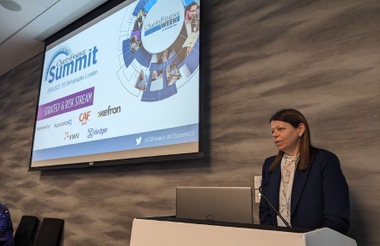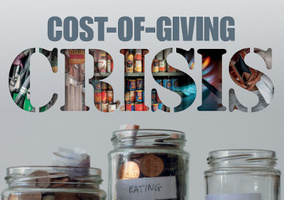Charities should not be ‘overly apologetic’ to funders or their trustees when considering pay rises for their staff, the chief executive officer of CAF Bank and CAF charity services has said.
Speaking last week at the Charity Finance Summit 2023, Alison Taylor said charities have a duty of care towards their employees and that it is crucial they get the people agenda right to succeed.
Taylor also unveiled the findings of CAF’s latest Charity Resilience Index, which tracks how charities are experiencing and responding to the cost-of-living crisis.
It found that two-fifths of 600 charities surveyed are now faced with unsustainable demand while one in eight are turning away service users.
Resilience is key
Discussing ongoing challenges such as Covid-19 and Brexit, Taylor said “it feels like it’s one mini or maxi crisis to the next”.
“We’ve got extraordinary challenges from political uncertainty across the globe. We’ve got the situation in Ukraine, financial uncertainty right across the globe, and, here in the UK, inflation.
“We’ve got an exponentially increasing rate of change in technology and artificial intelligence that we need to think about. All of that is wrapping up and contributing to the cost-of-living crisis that’s now really biting for individuals, organisations and charities right across the piece.”
She said that “resilience is absolutely the most critical component that probably unites everybody”. “We all need it across our organisations.”
Most charities worried about survival
Taylor presented the findings of CAF’s Charity Resilience Index, which surveyed over 600 charities in September.
The index shows that just over half of respondents are worried about their survival in the current economic climate and 26% have had to make cuts to their services.
Some 53% of charities are “at full capacity for their services”, with 41% saying they can meet demand but have no capacity to help more people and 12% saying they cannot meet demand and had to turn people away.
Meanwhile, just under half of charities “feel pressure on their finances” because of utilities costs, while one in seven are “locked into an unfavourable energy tariff”.
Despite the government energy bills discount scheme, almost a third of respondents “disagreed that they have been able to get support to cope with the cost of their utilities”.
Taylor said: “That’s a pretty bloody picture. We then did some more qualitative questions about how people are feeling across the board, and the kind of quotes were: ‘We’re constantly firefighting, overwhelmed, hyper fatigued.’ Many mentions of burnout, and, overall, a sense of: ‘This is now having a dramatic impact on morale, both for our staff and volunteer base.’ There are some really heartbreaking stories that have come in some of that.
“I think, against that backdrop, it’s financial resilience, but it has to be personal resilience as well. For our organisations to get through this period, we’re going to need both.”
‘We can’t be overly apologetic’
Taylor said that the “mental health challenges” have been on the rise since the start of the pandemic and charities have “a real duty of care, whether it’s our volunteer base or our workforces, to have the support mechanisms around that”.
“It doesn’t matter what else we do from a financial planning perspective, or whatever changes we make if we don’t get that people agenda right, we’re clearly not set for success.
“So, I think understanding that however much we want to pin down costs, we’ve got to think strategically about investing in key roles, our staff, as individuals are facing all of the same cost increases that our organisations are. They need to earn enough to deal with that.”
She added: “We can’t be overly apologetic to our funders, trustees or whoever that we’re having to put through to be pay rises because if we don’t, it cannot be right for the staff that we have, and frankly, they’ll have no choice, however connected they’re with our purpose, they’ll have to move and it always costs more to replace.
“The organisational knowledge that you lose sometimes through that, the upheaval for the business, it’s more change on top of the changes already handled. Trying to get stability and a sense of psychological safety and financial safety for our staff is completely important.”
Related articles












